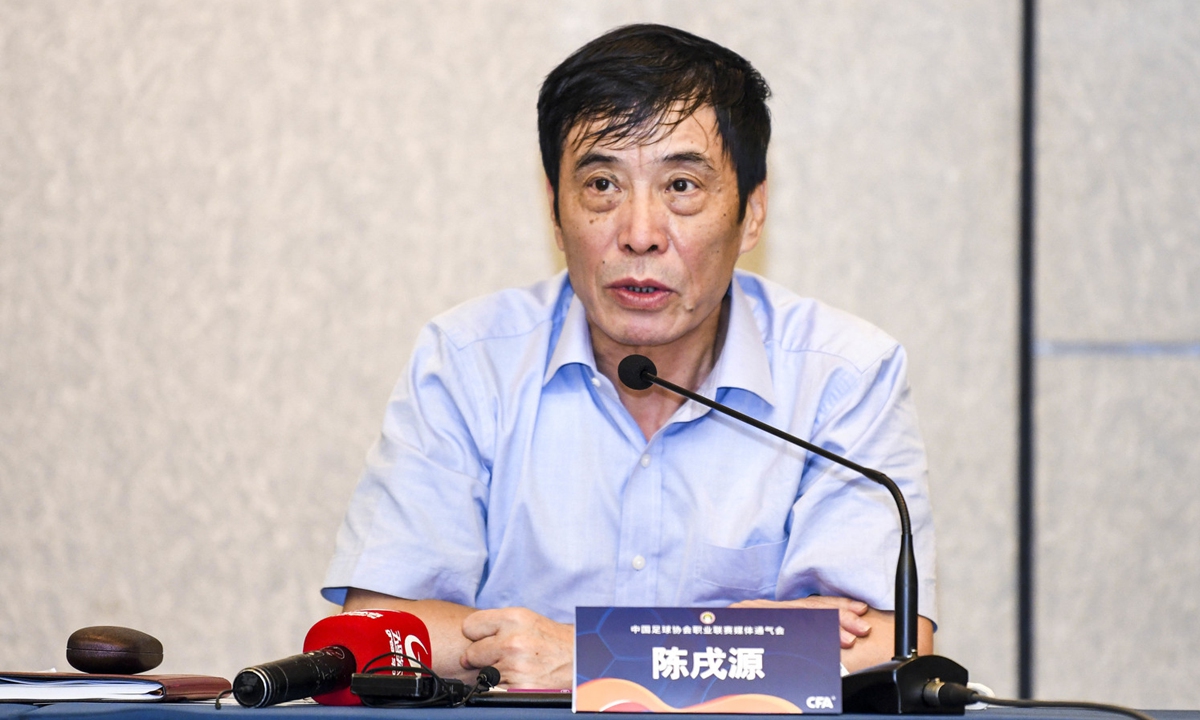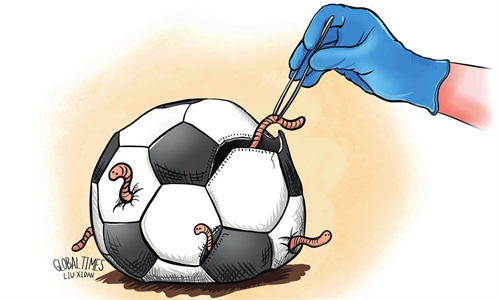Chinese soccer faces anti-graft storm as top official falls; sport could 'gain window of development' in next few years

Chinese Football Association President Chen Xuyuan Photo: Courtesy of the CFA
More important figures of Chinese soccer have been brought down, according to statements from disciplinary and legal authorities in the past few days, as the anti-corruption storm in Chinese soccer continues to deepen.
On Tuesday night, Chen Xuyuan, president of the Chinese Football Association (CFA), was among the latest individuals placed under investigation on suspicion of serious violations of law and discipline, according to the Hubei Provincial Commission for Discipline Inspection. On the same day, China Fortune Land Development Co announced that its co-president, Meng Jing, had been detained. Meng is a former board member of the Hebei Football Club. Later, on Wednesday night, it was reported that the case of suspected corruption and bribery involving Wang Dengfeng, former vice president of the CFA, has been transferred to the procuratorial authorities for review and prosecution, according to the Supreme People's Procuratorate.
Both Chen and Meng have close relations with Li Tie, former head coach of China men's national soccer team who was previously investigated due to alleged serious violation of laws by authorities. Several media outlets have reported that Chen Xuyuan strongly supported Li Tie in the head coach competition. Chen once intervened in a labor dispute between Li Tie and his former club, the now-defunct Wuhan Zall, and even personally pressured the club to help Li get his unpaid salary, according to sources of many senior reporters on Chinese football. Meng was a director of the team when Li was the head coach of Hebei China Fortune football club.
On Wednesday, the CFA issued a statement saying that it firmly supports the disciplinary and supervisory authorities to conduct an investigation into Chen Xuyuan.
The investigation of Chen fully reflects the determination and zero tolerance in the fight against corruption, the CFA said in the statement, and it pledged to create upright soccer ecology and further the reform and development of Chinese soccer.
Since the investigation of Li Tie in November 2022 for serious violations of the law, a number of players, managers and officials have been put under investigation, including former secretary general of the CFA Liu Yi and executive vice secretary general of the CFA and head of the national team management department Chen Yongliang.
The investigation of several soccer figures in a row, including high-level officials, shows that the latest anti-corruption storm in Chinese soccer is reaching a peak. Chen's fall reflects the great determination of this campaign, observers noted.
Public information shows that Chen Xuyuan was a dock worker in Shanghai when he was young. Later, he earned an MBA degree and worked for Shanghai Port Group. Chen, previously serving as deputy director of the Shanghai Port Authority and Party secretary and chairman of Shanghai International Port Co, took the position of CFA president in December 2019.
"I want to step down and solidify the foundation of Chinese soccer development, honestly follow the laws of soccer development and do every piece of work to soccer development seriously." This is the public testimonial Chen made when he was inaugurated as CFA president in 2019.
Chen is the first dedicated president of the CFA since its establishment, and the first association president in history to come from a non-sports management system. As such, his appointment carried with it the expectations from the public. However, just over three years later, he ended up the first president in the history of the CFA to subject to investigation before completing his term.
Prior to being embroiled in this scandal, many of Chen's decisions as the leader of Chinese soccer have been extremely controversial. Since his election, Chen has made various sweeping policy reforms. Many of Chen's reforms have been criticized and opposed by the public, but some also argued that his intentions were positive, represented by his strong desire to move Chinese soccer away from "over-capitalization" to become more of a socially beneficial public service.
Before Chen was appointed, Chinese clubs had for some time been attracting many stars from overseas leagues with high salaries, while the salaries and transfer fees of top Chinese players had been rising. When Chen took office, he limited the cap on transfer fees and annual salaries and drastically reduced most players' salaries, making the Chinese league less attractive to high-level players from abroad.
He also enforced the requirement to neutralize the names of soccer clubs and did not offer a buffer period to change the names. This meant that companies that invested in the clubs could no longer put their corporate names in the team names, seriously hurting the willingness of club investors to invest.
Eventually, many companies withdrew from sponsoring teams, resulting in many teams becoming unsustainable and having to withdraw from the league or even disband. The amount of sponsorship by some companies declined, resulting in some teams being unable to operate normally and even owing salaries to players for extended periods, Xinhua News Agency reported
After the attractiveness of the Chinese Super League (CSL) declined, revenue also kept declining. In 2015, the naming rights of the CSL were sold for 8 billion yuan ($1.16 billion) for 5 years, with an annual average of 1.6 billion yuan. Currently, the price is 100 million yuan for a year.
Since Chen took office, the dividends received by CSL teams have been declining year after year. In the 2022 season, 8 million yuan was distributed to CSL teams. In 2021, the number was 10 million. During the heyday of the CSL, the number was 60 million. Chen also called for a reduction in the share of broadcast fees received by each team, according to Red Star News
However, Chen's once-promised plan to build a professional league for the Chinese Super League, considered the most crucial part of China's soccer reform, has been stalled for years.
During Chen's three years as CFA president, the appeal of China's soccer league has plummeted, and some rumors of match-fixing have surfaced. The Chinese men's national team has also struggled to achieve satisfactory results, and some players have even shown negative attitudes during matches, disappointing the public.
Every time there is a large-scale anti-corruption move in Chinese soccer, it is always followed by a window of time for progress and healthy development, veteran soccer journalist and former CFA official Wang Dazhao told the Global Times on Wednesday.
"Whether this period can be used and how it can be used is very important for Chinese soccer," he stressed, adding that it would be a great thing for Chinese soccer if its personnel can make good use of this period.
But if that period is not put to good use, then there is a chance that Chinese soccer slide back to the same old ways, he said. "This reminds us that the current massive anti-corruption campaign in Chinese soccer comes just 14 years after the last one."
The Chinese soccer community had experienced an "earthquake" in 2009 because of the match-fixing scandal. Xie Yalong and Nan Yong, the former vice chairman of the CFA and former director of the National Football Management Center, were both arrested and later sentenced to 10.5 years in prison.
Many players were also arrested and several clubs were sentenced to points, fines and relegation. The handling of this match-fixing case was not entirely concluded until 2013.
However, looking back from 10 years later, this huge storm, regretfully, only brought a short period of calm in the Chinese professional league, while the management and competitive level of Chinese soccer was not substantially improved.
In the ten or so years since the last match-fixing case, Chinese soccer had actually appeared to be in a very good situation, Wang said.
Very good policy documents had been put in place and were well implemented. Then, just when Chinese soccer was about to embark on a path of real progress, some ill-natured hoping to profit from it felt the opportunity presented themselves and started to block development and grab benefits.
"That's what we should be most wary of," he said.
"It is important that Chinese soccer should have an effective regulatory mechanism in place to safeguard the efforts of those who are truly trying to contribute to the industry," he said.
"Over a period of time, a strong regulatory mechanism will ensure the short-term development of soccer to await the long-term progress of multiple factors such as social attitudes, sports culture and economic development, which will enable Chinese soccer to achieve long-term development," Wang said.
One of the positive elements, to start with, is that even in the trough of Chinese soccer, there is still a lot of legacy that deserves to be passed on, observers noted.
The spirit and slogans that have been used by the national team over those decades, the experiences of progress and obstacles in the development process, the soccer culture that has always been well passed on in some cities, these remain the legacy and the seeds of the future of Chinese soccer.
Even in the last decade, the restructuring of the CFA, the reorganization of local football associations and the change of ownership of professional clubs are also efforts that deserve recognition, Wang said.
One of the most important, of course, is the Chinese people who have always supported Chinese soccer.
"As a casual fan who has followed the national soccer team for years, I long to really see the light after all this time. I will not give up this dream," a blogger wrote on Wednesday after learning of Chen's investigation.

